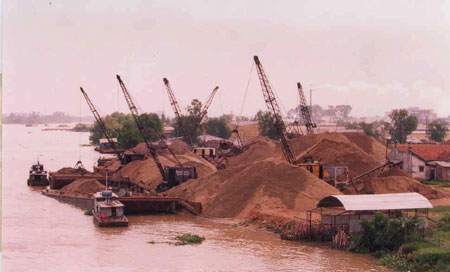
Illegal sand exploitation by local residents and authorities along the Dong Nai River has increased rather than diminished in the last decade, despite efforts to ban it.
Illegal sand exploitation by local residents and authorities along the Dong Nai River has increased rather than diminished in the last decade, despite efforts to ban it.
 |
| Illegal sand mining is rampant along the Dong Nai River in Dong Nai Province, the country's longest inland river. It has caused many problems for local residents, particularly erosion which threatens their houses |
Recently, waterway police and officials from Dong Nai Province's Department of Natural Resources and Environment conducted an inspection of the 500-km river.
However, they met with resistance. Although illegal sand exploiters, after being detected by inspectors, rammed their boats against barriers or even resisted those who were on duty, no one was arrested.
Beside waste water discharged from nearby industrial parks and hydropower plants, the country's longest inland river has endured illegal sand exploitation for years, causing problems for local residents.
The river originates from the Central Highlands province of Lam Dong.
According to Nguoi Lao Dong (The Labourer) newspaper, local residents who have lost land to the river because of sand exploitation said they the situation was hopeless.
Farmers in Bien Hoa city's Quyet Thang Ward said their pomelo and mango gardens located along the river disappeared due to landslides. Vinh Cuu District's Thanh Phu ward has been affected as well.
Local residents said they no longer could rely on local authorities and had tried to stop the exploitation themselves. But the sand exploiters are aggressive and difficult to deal with, they said.
The province's police and officials from the local department of Natural Resources and Environment have held meetings about the problem over the last decade, but nothing has been resolved.
According to an official of the Natural Resources and Environment Department in Dinh Quan District, the problem is lack of manpower and equipment to catch the illegal sand exploiters.
Senior Lieutenant Colonel Luu Minh Tam, deputy head of Dong Nai's Public Security's waterway management, said he was pessimistic about the battle against the exploiters.
"The fight against illegal sand exploitation will end when there is no demand for construction. I hope to see more cooperation between the sectors," he was quoted as saying by the newspaper.
Some people who were not quoted said that informers tell exploiters in advance of upcoming raids along the river.
Vo Van Chanh, deputy director of Dong Nai Province's Department of Natural Resources and Environment, said the province would work with other agencies to strengthen inspections of the buying and trading of sand in the locality.
The HCM City section of Dong Nai River also faces sand exploitation.
Dao Anh Kiet, director of HCM City's Department of Natural Resources and Environment, who took questions from the members of the city's People's Council about the issue recently, said the city had worked with officials in Binh Duong Province to stop sand exploitation.
According to Kiet, city officials last year caught more than 40 boats in District 9 and six boats in Cu Chi District as they were dredging up sand from the river.
Land erosion caused by sand exploitation has narrowed land plots of local residents and even swept away several houses.
(Source: VNS)




